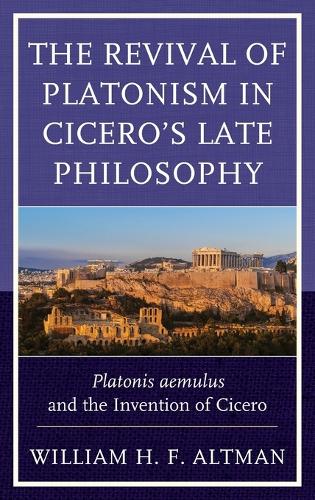
The Revival of Platonism in Cicero's Late Philosophy: Platonis aemulus and the Invention of Cicero
(Hardback)
Available Formats
Publishing Details
The Revival of Platonism in Cicero's Late Philosophy: Platonis aemulus and the Invention of Cicero
By (Author) William H. F. Altman
Bloomsbury Publishing PLC
Lexington Books
13th April 2016
United States
Classifications
Professional and Scholarly
Non Fiction
186
Physical Properties
Hardback
384
Width 160mm, Height 237mm, Spine 33mm
744g
Description
Less than two years before his murder, Cicero created a catalogue of his philosophical writings that included dialogues he had written years before, numerous recently completed works, and even one he had not yet begun to write, all arranged in the order he intended them to be read, beginning with the introductory Hortensius, rather than in accordance with order of composition. Following the order of the De divinatione catalogue, William H. F. Altman considers each of Ciceros late works as part of a coherent philosophical project determined throughout by its authors Platonism. Locating the parallel between Platos Allegory of the Cave and Ciceros Dream of Scipio at the center of Ciceros life and thought as both philosopher and orator, Altman argues that Cicero is not only Platos rival (it was Quintilian who called him Platonis aemulus) but also a peerless guide to what it means to be a Platonist, especially since Platos legacy was as hotly debated in his own time as it still is in ours. Distinctive of Ciceros late dialogues is the invention of a character named Cicero, an amiable if incompetent adherent of the New Academy whose primary concern is only with what is truth-like (veri simile). Following Augustines lead, Altman reveals the deliberate inadequacy of this pose and argues that Cicero himself, the writer of dialogues who used Cicero as one of many philosophical personae, must always be sought elsewhere: in direct dialogue with the dialogues of Plato, the teacher he revered and whose Platonism he revived. The Revival of Platonism in Ciceros Late Philosophy: Platonis aemulus and the Invention of Cicero is a must read for anyone working in classical studies, ancient philosophy, ancient history, or the history of philosophy.
Reviews
In conclusion, Altman has written an innovative book that uses close readings of Cicero and careful attention to his reading of Plato to challenge a number of orthodoxies and to push to see new elements of Ciceros thought. . . This book will be valuable not solely to scholars of Cicero but anyone interested in intellectual history, as Cicero is one of the missing steps between Plato, Aristotle, Hellenistic Philosophy and Modernity. * POLIS: The Journal for Ancient Greek Political Thought *
This is a book fizzing with energy, and full of learning of many sorts, from which any discriminating reader stands to gain. * The Classical Review *
Altmans essays, as he explores Ciceros hidden and open Platonism, are as engaging and stimulating as one might imagine. Few if any contemporaries have read as widely and deeply in Ciceros writings. With objectivity but no pretended scholarly detachment, he brings his immense erudition to his personal engagement of Cicero. He finds himself in awe at Ciceros integrity and achievement as a thinker, writer and political leader. We and our modern republics, he rightly concludes, are much in need of a properly understood Cicero. -- Walter Nicgorski, University of Notre Dame
Author Bio
William H. F. Altman, an independent scholar now living in Brazil, is a retired public high school teacher with more than thirty years experience teaching history, Latin, and the humanities.
